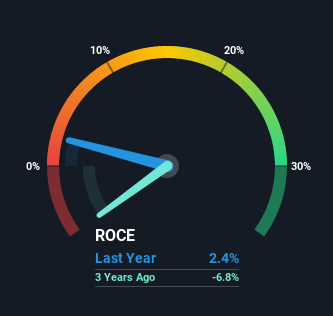- Malaysia
- /
- Construction
- /
- KLSE:BDB
Bina Darulaman Berhad (KLSE:BDB) May Have Issues Allocating Its Capital

If you're looking at a mature business that's past the growth phase, what are some of the underlying trends that pop up? When we see a declining return on capital employed (ROCE) in conjunction with a declining base of capital employed, that's often how a mature business shows signs of aging. This reveals that the company isn't compounding shareholder wealth because returns are falling and its net asset base is shrinking. On that note, looking into Bina Darulaman Berhad (KLSE:BDB), we weren't too upbeat about how things were going.
What is Return On Capital Employed (ROCE)?
For those who don't know, ROCE is a measure of a company's yearly pre-tax profit (its return), relative to the capital employed in the business. The formula for this calculation on Bina Darulaman Berhad is:
Return on Capital Employed = Earnings Before Interest and Tax (EBIT) ÷ (Total Assets - Current Liabilities)
0.024 = RM12m ÷ (RM664m - RM176m) (Based on the trailing twelve months to September 2021).
Thus, Bina Darulaman Berhad has an ROCE of 2.4%. Ultimately, that's a low return and it under-performs the Construction industry average of 5.7%.
View our latest analysis for Bina Darulaman Berhad

Historical performance is a great place to start when researching a stock so above you can see the gauge for Bina Darulaman Berhad's ROCE against it's prior returns. If you're interested in investigating Bina Darulaman Berhad's past further, check out this free graph of past earnings, revenue and cash flow.
What Can We Tell From Bina Darulaman Berhad's ROCE Trend?
The trend of returns that Bina Darulaman Berhad is generating are raising some concerns. To be more specific, today's ROCE was 4.3% five years ago but has since fallen to 2.4%. What's equally concerning is that the amount of capital deployed in the business has shrunk by 39% over that same period. The combination of lower ROCE and less capital employed can indicate that a business is likely to be facing some competitive headwinds or seeing an erosion to its moat. If these underlying trends continue, we wouldn't be too optimistic going forward.
The Bottom Line
To see Bina Darulaman Berhad reducing the capital employed in the business in tandem with diminishing returns, is concerning. In spite of that, the stock has delivered a 3.6% return to shareholders who held over the last five years. Regardless, we don't like the trends as they are and if they persist, we think you might find better investments elsewhere.
Bina Darulaman Berhad does come with some risks though, we found 4 warning signs in our investment analysis, and 1 of those doesn't sit too well with us...
For those who like to invest in solid companies, check out this free list of companies with solid balance sheets and high returns on equity.
Valuation is complex, but we're here to simplify it.
Discover if Bina Darulaman Berhad might be undervalued or overvalued with our detailed analysis, featuring fair value estimates, potential risks, dividends, insider trades, and its financial condition.
Access Free AnalysisHave feedback on this article? Concerned about the content? Get in touch with us directly. Alternatively, email editorial-team (at) simplywallst.com.
This article by Simply Wall St is general in nature. We provide commentary based on historical data and analyst forecasts only using an unbiased methodology and our articles are not intended to be financial advice. It does not constitute a recommendation to buy or sell any stock, and does not take account of your objectives, or your financial situation. We aim to bring you long-term focused analysis driven by fundamental data. Note that our analysis may not factor in the latest price-sensitive company announcements or qualitative material. Simply Wall St has no position in any stocks mentioned.
About KLSE:BDB
Bina Darulaman Berhad
An investment holding company, engages in the oil palm plantation, property development, and management service businesses in Malaysia.
Excellent balance sheet low.
Market Insights
Community Narratives



